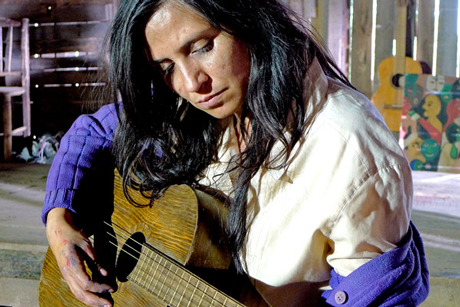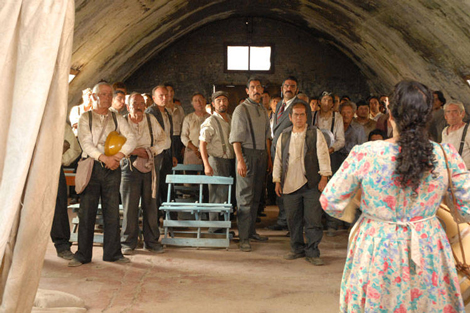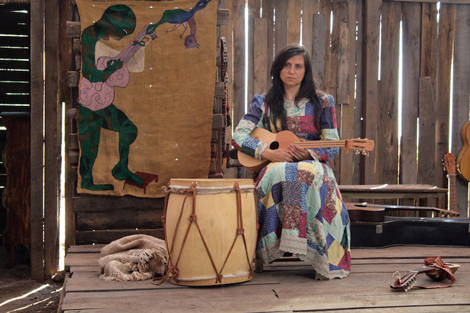|
|
Reviewed by Glenn Erickson
Andrés Wood's 2011 Violeta Went to Heaven (Violeta se fue a los cielos) gained attention at film festivals the world over, but its only major notice in the U.S. was a win at Sundance. Chile barely exists in the American consciousness, despite mumblings about the C.I.A. aiding its overthrow forty years ago. Ironically on September 11, 1973. Our news hasn't really reported the biggest economic story of the last twenty years -- China is South America's big business partner now, steadily supplanting the Yankee influence. Have you even heard of The Road?

In that context it's no surprise that Americans not attuned to the Latin American music would not have heard of Violeta Parra, the Chilean folksinger and artist who provided the foundation for a new era of folk music. From a poor rural background, Parra grew in popularity, traveled the world singing her music and even had her paintings hung in the Louvre. She attracted attention with songs expressing the oppression of women and workers. Gracias a la Vida is perhaps the one song that has become a standard worldwide. Parra's voice is soulful and her lyrics are politically penetrating. Mercedes Sosa and Joan Baez helped popularize the committed Chilean activist-singer.
Wood's impressionist biography skips back and forth in time to paint an emotional portrait of the singer. Recurring visions recur of her parents, as do images of animals from her childhood in the rough Chilean mountain country. Actress Francisca Gavilán plays Violeta, and also sings the role, beautifully. The physical and vocal match here is even better than Sissy Spacek in Coal Miner's Daughter -- Gavilán may as well be Violeta.
Parra uses her charm to neutralize a television interviewer intent on making her seem like a radical. We see her as a child, interacting with her musician father, who succumbs to gambling and drinking. We see her prying folk songs from an older male singer who has taken a vow of silence. Violeta is fiercely determined. She walks mountain trails to find folksingers, her young son Ángel dragging a heavy tape recorder behind her. As part of a tiny entertainment troupe traveling between mining camps, she sings with her sister Hilda (Gabriela Aguilera) and her poet brother Nicanor (Christian Quevedo). When one camp turns them down because it is holy week, Violeta forces them to accept a religious show, which nevertheless delivers her progressive messages. In Europe she finds a level of recognition denied her in Chile. Violeta creates beautiful folk canvasses in Paris, and plays the serious artist to get them exhibited by the Louvre.

Violeta needs things to be her way, which complicates her life. Her lover is Gilbert Favre, a Swiss flautist (Thomas Durand) always knows that he does not come first. Her commitment to her art takes a tragic toll. While on tour in Europe, her baby daughter dies back in Chile, from pneumonia. Violeta weeps, but her resolve is not shaken. The critical TV interviewer presses her on the issue of guilt, but Violeta says does not feel that way. "If I humiliated, or oppressed, or stole, or hurt someone I would feel guilty." But she chooses not to return to Chile for two full years. Reading about Violeta, we understand that her extended family was notable in the arts, and that they are very close-knit. In the film it looks as if Ms. Parra abandons her children to pursue her fortunes overseas, or ignores their needs while concentrating on her aims, desires, and lovers.
Eliseo Altunaga's screenplay does not always spell out exact relationships, and we are given few cues as to exactly when things are happening. Violta's life does not fit into a conventional career arc. She never seems to have any money, although at one point it looks as if she has a radio show. We do not know if she sold any records in her lifetime. In her later years we see the mayor of a town giving her a hilltop plot of land, upon which she builds a tent. Her idea is to found a folk music gathering point, and for a time her 'alternative music destination' seems a hit. But overall the story of Violeta Parra is not a happy one. She cannot sustain herself on folklorist art in her own country and ends up living in the most humble of shacks. Her lover Favre has moved on, but she begs him to stay with her, even if he brings his 'other woman' with him. Violeta's life has seemingly been a gift to others.
The movie does not investigate Violeta's politics. The closest we come to her communist affiliation is when she humorously deflects a question by the TV interviewer. Yet several scenes put her political position in relief. Chilean miners cheer when she sings of the hardship and injustice they must endure: speaking such thoughts aloud might have dire consequences. In Poland she performs before a rapt audience of students, despite the fact that few of them know the lyrics she is singing. Much later she's invited to sing at a fancy dinner in what looks like a palace, for an audience of Chilean elites. The fashionable guests drink and listen politely, but the host cuts Violeta Parra off after one song to announce that dinner is served. He asks Violeta if she'd like to eat, and then suggests that she go look for some food in the kitchen. Violeta does not take the insult quietly.

Andrés Wood reportedly filmed the Chilean scenes for his movie in Argentina. He, writer Altunaga and editor Andrea Chignoli (No) have brought good judgment and fine artistry to their picture, which remains at all times focused on its fascinating subject.
Kino Lorber's DVD of Violeta Went to Heaven is an excellent encoding of this emotional tale. Technically the transfer betrays no flaws. The stereo audio is excellent and the music is fascinating -- Ms. Gavilán's voice is piercingly dramatic. Sometimes she sings accompanied only by a single drum, and yet the power of her simple songs (with the pointed lyrics) comes through.
Non-removable English subs translate the song lyrics as well, all except for one tune sung by the aged male folk singer, while Violeta transcribes the lyrics.
An original trailer is present. For a moment we're concerned because the trailer is matted as if the film were originally anamorphic 2:35, yet the feature itself is un-matted widescreen at 1:78. A comparison of shots reveals that the trailer has been cropped, not the feature - it has apparently been transferred accurately.
Various compilation CDs by Violeta Parra are available online; my personal favorite rendition of Gracias a la Vida is by Mercedes Sosa, on her CD Vengo a Ofrecer Mi Corazon.
On a scale of Excellent, Good, Fair, and Poor,
Violeta Went to Heaven rates:
Movie: Excellent
Video: Excellent
Sound: Excellent
Supplements: trailer
Deaf and Hearing Impaired Friendly?
YES; Subtitles: English (non-removable)
Packaging: Keep case
Reviewed: September 1, 2013

DVD Savant Text © Copyright 2013 Glenn Erickson
See more exclusive reviews on the Savant Main Page.
Reviews on the Savant main site have additional credits information and are often updated and annotated with reader input and graphics.
Also, don't forget the
2011 Savant Wish List.
T'was Ever Thus.
Return to Top of Page
|

